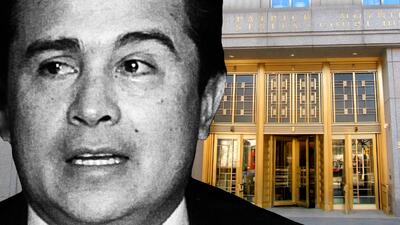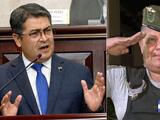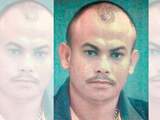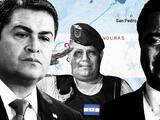Honduran president's brother sentenced to life in prison for drug trafficking

Former Honduran congressman Juan Antonio 'Tony' Hernandez, was sentenced to life plus 30 years in prison in New York federal court on Tuesday almost 18 months after he was convicted in the same court on drug trafficking and related weapons charges.
"Based upon Juan Antonio's free choice to engage in a life of drug trafficking over a 12-year period ... a sentence of life imprisonment is richly deserved," said Judge Kevin Castel. The judge also sentenced Hernandez to pay $138.5 million dollars in forfeiture for trafficking an estimated 185,000 kilos of cocaine.
In a room near the courtroom where members of the public watched the proceedings on a TV monitor, applause broke out among a group of Hondurans gathered there.
When he was allowed to speak before his sentence was announced, Hernandez, 41, expressed no remorse. Instead, he complained to the judge about his lawyer who he said had failed to represent him properly. He said they had only been able to meet in person twice, with half a dozen phone calls.
"I feel betrayed ... I feel my rights have been violated," Hernandez said.
But the judge admonished Hernandez saying there was "not an iota of evidence" that his rights had been in any way infringed upon, "not even an insinuation."
When it as his turn, prosecutor Matthew Laroche, told the court that he was shocked by Hernandez's arrogance and lack of remorse. "It is stunning. It speaks exactly to who this person is," he said. "He has shown no remorse to this day. He doesn't care, clearly, how his crimes have affected his country," he added, citing the extreme poverty and lawlessness in Honduras.
Laroche said Hernandez used his privileged upbringing and political connections to "conspire with the most powerful individuals" in Honduras, including his brother, president Juan Orlando Hernandez. "He smothered Honduras with corruption in order to achieve astonishing crimes," Laroche said.
"The defendant is a uniquely bad character, who along with his brother, is at the center of years of state-sponsored drug trafficking," he added.
In announcing the reasoning behind his decision to impose a life sentence, judge Castel said he was influenced by the fact that Hernandez was born into a life of privilege, earned a degree as a lawyer and was a member of Congress. He "could have used his considerable talents for good. But Juan Antonio elected to go in a very different direction," he said.
He calculated that the 185,000 kilos trafficked by Tony Hernandez was the equivalent of 1.5 billion doses of cocaine.
The sentence punctuates a trial that implicated President Juan Orlando Hernández as an unindicted co-conspirator accused of receiving millions in bribes from drug traffickers.
“Without corrupt politicians, the kind of drug trafficking at issue in this case is difficult if not impossible,” wrote prosecutors in a court filing earlier this month, citing the need for a deterrent and requesting a life sentence.
In response, an attorney for Tony Hernández, Peter E. Brill, affirmed his client’s innocence and pleaded for leniency, calling the trial politically motivated.
“This case is yet another in a long line of misadventures in foreign policy intervention undertaken by the United States government this time in pursuit of regime change at the highest levels in Honduras,” wrote Brill in the defense’s sentencing submission.
The case revealed the depths of drug traffickers’ success in capturing the Honduran state as well as the complicated relations between the U.S. and President Hernández, who was once considered a staunch ally in the war on drugs as well as stemming the tide of Central American migrants.
President Hernández has denied all accusations of links to drug traffickers, saying recently that they have found a “magic key” to reduce their prison sentences by telling lies against him.
Hernandez tweeted on Tuesday morning that the news from New York "will be painful" for his family.
The DEA began investigating Hernández and others in 2013. Mounting allegations since the trial, including the conviction earlier this month of another Honduran drug trafficker accused of bribing the president, have made clear that the investigation is ongoing.
Early Days
According to prosecutors, Tony Hernández started working with drug traffickers around 2004, providing information on police checkpoints and air traffic radars. At the time, Juan Orlando Hernández was serving his second term in Congress.
By the time a 2009 coup led to a shift in control of the government to Hernández’s National Party, Tony Hernández had become a cocaine supplier, with a lab in Colombia that apparently stamped some of the kilos with his initials – TH.
An intercepted image of a kilo stamped with the TH initials was key evidence at the trial. Several cooperating witnesses testified having seen the stamp on kilos of cocaine purchased from Tony Hernández. Prosecutors said it was a sign that he operated without fear of prosecution.
Meanwhile, Tony Hernández also facilitated increasingly large bribes from drug traffickers to his brother’s presidential campaign in 2013, including $1 million from the former head of the Sinaloa Cartel, Joaquin “El Chapo” Guzman.
A former National Party mayor and confessed drug trafficker, Alexander Ardon, testified that he witnessed Tony Hernández receive that bribe and that he had also paid millions to Juan Orlando Hernández and other politicians.
The Fall
In January 2014, Juan Orlando Hernández was inaugurated as president and Tony Hernández became a legislator. The family had never been more powerful, yet things slowly began to unravel.
That same month, a cocaine lab was raided for a second time in the family’s home department. Tony Hernández, a lawyer by trade, represented the two men captured and allegedly helped them evade justice. The circumstances raised suspicion and rumors of Tony Hernández’s involvement in drug trafficking circulated publicly for the first time.
In 2016, new allegations were made public, including by a military intelligence officer who revealed that he’d intercepted a helicopter carrying cocaine in 2014 that sources told him belonged to Tony Hernández and the minister of defense.
In an effort to clear his name, Tony Hernández traveled to the U.S. in October of that year to meet with the DEA and federal prosecutors. During that interview, he admitted to knowing several drug traffickers while denying that he had met with the head of the powerful Cachiros drug clan, Devis Leonel Rivera, despite being shown images from the encounter.
A secretly recorded video of the meeting, held at a Denny’s restaurant in Tegucigalpa in February 2014, was presented at trial, and Tony Hernández was charged with lying to a federal agent.
In November 2017, Juan Orlando Hernández claimed victory in an election marred by allegations of fraud. A year later, Tony Hernández, apparently confident that his last name provided immunity, traveled to Miami, where he was arrested at the airport.
In June of 2019, Honduran authorities captured a drug trafficker whose ledgers named Tony Hernández and implicated him in multiple large-scale cocaine shipments.
The Aftermath
About a week after Tony was convicted, the author of the ledgers, Nery Orlando Lopez Sanabria, was brutally murdered inside a maximum-security prison in Honduras. A Univision investigation revealed that Lopez had been in contact with the DEA through his lawyers and wished to cooperate.
Since then, prosecutors have made plain their intentions to pursue other co-conspirators in the case. Three of them, including a former police officer and cousin of Tony and Juan Orlando Hernández, have turned themselves over to U.S. authorities and another two were indicted.
President Hernández was named as a co-conspirator in the case against former national police chief Juan Carlos “El Tigre” Bonilla and businessman Geovanny Fuentes, who was convicted of drug trafficking and weapons charges by a New York jury earlier this month.
A witness in that trial testified that he saw Fuentes pay bribes to President Hernández during the 2013 presidential campaign.
Tony Hernández is expected to appeal his conviction. To reduce his sentence, he could also choose someday to cooperate with prosecutors. That possibility, however, seems unlikely, because he would potentially have to share incriminating information about his brother.
“Such cooperation must be complete; in other words, you can’t pick and choose who you are going to cooperate against, you have to tell the prosecutors everything,” said Rebecca Monck Ricigliano, a former prosecutor and chief of the Narcotics Unit for the Southern District of New York. “So that would require information about the president of Honduras, assuming he has any.”


